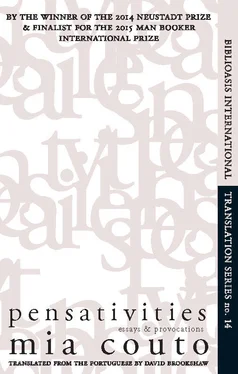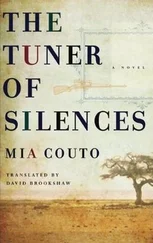The writer isn’t just someone who writes. He’s someone who produces thought, someone capable of pollinating others with feeling and delight.
More than this, the writer challenges the basis of thought itself. He goes further than challenging the limits of political correctness. He subverts the very criteria that define what is correct, he questions the boundaries of reason.
Mozambican writers nowadays fulfill a commitment of an ethical type: to reflect on this Mozambique but to dream of another Mozambique. They run the risk, like all artists in every other country, of being devoured by the nation they helped to liberate.
We have passed from a period in which our heroes always ended up dead — Eduardo Mondlane, Samora Machel, Carlos Cardoso — into a time when heroes are not even born. We await the renewal of a state of passion that we experienced once before, while hoping for the rekindling of love between writing and the nation as a home made for dreaming. We want and dream of a nation and a continent that no longer need heroes.
Address given at the award ceremony for the
International Prize for the Twelve Best African Novels,
Cape Town, South Africa, July 2002.
What can a writer say on a theme such as the one proposed: “The Globalization of Computer Technology”? A number of things occurred to me as I thought about the subject. I was preparing this address in the silence of an old room, when I happened to see a spider’s web in a corner of the ceiling. This little creature hadn’t planned and built a house to live in, but a trap to hunt its prey. The English call this weaving together of threads a web. A web can mean a network, but it can also be a trap. This ambiguity triggered an old concern of mine. I would like to share my disquiet with you.
I am worried by the way we are being tempted to view technology as the global antidote to our multiple evils. Many of us believe that technological advance is going to rescue us from poverty. This belief leaves us vulnerable to a few sellers of magical products. The future may not just be better — as the slogan tells us — but easier, as easy as pressing a key. For us to be like them, the developed world, it will be enough for us to fulfill certain indicators within the criteria presented by our advisers, and hey presto, we’ll join the club.
We know this isn’t true. I don’t know why we want so much to be like “them,” and not ourselves, following our own routes to destinations that we have invented on our own. What separates us from wealth involves, above all, questions of nature rather than technology. It involves attitudes, wishes, political determination and a stance with respect to the question of culture. Digitalization won’t convert us into modern beings. Putting our ear to a cellphone isn’t going to turn us into producers of anything at all. If we don’t exercise any independence in acts that are, at heart, acts of culture, we shall enter the universe of what we call the digital society, but we shall do it as a minor player, a secondary partner, from the periphery.
But this is a dance one joins without warning and without invitation. We’re already there, dazzled by the lights and the sound of the orchestra. But we’re not dancing to our own music, nor are we swaying to a rhythm that belongs to the body of our History.
We have all entered the dance hall: if we were supposed to pay for a ticket, then someone else has paid for us. Tomorrow, we’ll have to pay off the debt with interest. And we shall discover the bitter taste of a hangover (or, as we call it here, a babalaze ).
I don’t intend to make excuses for anything. After all, it’s inevitable that we should embrace the lustre of all these digital innovations. But I would just like to be sure that we are thinking about our place in this world, we who are a nation profoundly influenced by orality. And that we are working out how we may stand to gain if we develop our own project, capable of introducing changes and innovations into the projects of others. I would like to know whether we are sufficiently aware of how much we shall lose from this network of relationships to which we belong in the public space of our everyday lives. Rumours about unofficial markets, gossip concerning unofficial bus services: aren’t these the invaluable web pages of the Mozambican Internet?
I’m not an advocate of traditionalist solutions, but I worry about the easy availability of magic wands, fantastic solutions that we arrive at as if they were downloaded. Technical and scientific discoveries are presented to us in a messianic way in the pages of magazines: the genome is a new Christ able to save us from all illnesses, cloning is a passport to eternity. The idea hasn’t changed since the green revolution was first heralded in the 1970s as a way to salvage agriculture in poor countries. The green revolution has faded in colour, but other magical packages in countless other hues are still being exported to the Third World.
Until a few years ago, the frontier between the civilized and indigenous was to be abolished by the latter’s integration into European culture. Now, a new frontier may be emerging: on the one hand are the digitalized, and on the other, the ex-indigenous, destined to become the indigent and indigitalized. A new plan for citizenship is being drawn up. And, once again, we shall dwell on the periphery.
And so the Web is a network but also a spiderweb; this web that we have joined of our own accord, we shall be the spider as long as we develop a strategy. We shall be the fly if we persist in thinking with the mind of others.
An Episode Evoked
I am going to tell you an episode that really happened, and which may illustrate what I have been talking about. We were in the middle of the floods, the great inundations of the year 2000, when we were discovered by the international television channels (it’s incredible how only disaster turns the poor into a story). At that point, the Polana Hotel suddenly became a global telecommunications hub, an operational base for the BBC, CNN and other stations vying with each other over the tragedy. I’m not saying this was a bad thing. If it wasn’t for this intervention, then the drama of the floods wouldn’t have gained any visibility, and we would have received far less support. These latest floods were, in fact, an example of how the negative tendency of scratching around for disasters can sometimes work in our favour, to benefit those who are the eternal victims.
During those days, we were the centre of the universe. Many people in this world, which aspires to be a global village, were seeing the name and face of Mozambique for the first time. It wasn’t just Rosita who was born in unusual circumstances (in the canopy of a tree). For a large swathe of global television viewers, the image of ourselves as a country was being born.
We were in the middle of all this uproar when I got a nerve-wracking telephone call from London requesting a live television interview. Worse still, it would have to be in English. I was nervous. To speak live on the BBC and in English is to be catapulted into a terrain that is doubly unfamiliar and foreign.
We arranged for it to be at 10:30 at night and for me to go to the Polana Hotel. On the agreed night, I arrived and they told me to get into a “chapa” (which, as you know, is an unofficial vehicle for transporting passengers), and along with a team of journalists I set off on a nightmarish journey through the suburbs of Maputo. The journalists were all kitted out in uniform — khaki suits that were part military, part neo-ecological. I don’t know whether journalists assigned to work in the tropics always invest in this mythical attire. But those accompanying me in the old chapa had assumed the posture and the behaviour of newminted and semi-debonair Rambos, garbed at a branch of the Safari Store.
Читать дальше












